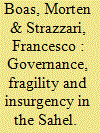|
|
|
Sort Order |
|
|
|
Items / Page
|
|
|
|
|
|
|
| Srl | Item |
| 1 |
ID:
122408


|
|
|
|
|
| Publication |
2013.
|
| Summary/Abstract |
How do jihadist insurgencies differ from non-jihadist ones? Jihadist insurgents, like all insurgents, seek to control the government, need money and weapons, and thrive where government is weak. Yet their cause-jihad at local, regional, and global levels-gives them instant friends and resources, but also built-in enemies and burdens. Jihadist insurgents often organize, recruit, and fund-raise differently than traditional insurgent groups. The agendas of these militant groups often go against the local residents' sense of nationalism and anger these communities with their extreme interpretations of Islam. To take advantage of this, the United States can amplify local voices that are best able to discredit these insurgents and press allied regimes to disrupt the mosques, schools, and fund-raising networks that help support them. However, Washington should also recognize that weakening these groups at the local level may make them more likely to embrace international terrorism. Allied efforts to co-opt jihadists may make area societies and governments less favorable to other U.S. policies. Finally, failed democratization-a particularly salient issue given the Arab Spring-risks playing into the jihadist narrative.
|
|
|
|
|
|
|
|
|
|
|
|
|
|
|
|
| 2 |
ID:
178521


|
|
|
|
|
| Summary/Abstract |
Once a region that rarely featured in debates about global security, the Sahel has become increasingly topical as it confronts the international community with intertwined challenges related to climate variability, poverty, food insecurity, population displacement, transnational crime, contested statehood and jihadist insurgencies. This Special Issue discerns the contours of political orders in the making. After situating the Sahel region in time and space, we focus on the trajectory of regional security dynamics over the past decade, which are marked by two military coups in Mali (2012 and 2020). In addressing state fragility and societal resilience in the context of increasing external intervention and growing international rivalry, we seek to consider broader and deeper transformations that can be neither ignored nor patched up through the framework of the ‘war on terror’ projected onto ‘ungoverned spaces’. Focusing especially on the mobilisation of material and immaterial resources, we apply political economy lenses in combination with a historical sociological approach to shed light on how extra-legal governance plays a crucial role in the deformation, transformation and reformation of political orders.
|
|
|
|
|
|
|
|
|
|
|
|
|
|
|
|
|
|
|
|
|